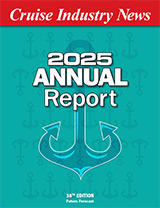Simon Fotakis, director of technology sales at SmartSea, has called on the maritime industry to not forget the importance of cybersecurity.
“The truth is, cybersecurity still lags behind where it needs to be,” said Fotakis. “We’re seeing advanced ships with cutting-edge green tech but often connected to weak IT infrastructures that are vulnerable to exploitation, espionage and sabotage.”
“Many in the maritime industry still treat cybersecurity as a checkbox instead of a core capability. It’s a dangerous disconnect from reality as a single intrusion could cripple a fleet and erase years of progress,” added Fotakis.
SmartSea said in a press release that despite increasing digital integration, the maritime sector remains highly vulnerable to cyber threats, many of which target poorly protected onboard IT systems rather than core navigation or propulsion infrastructure.
According to BIMCO, over 80 percent of shipowners have experienced a cyberattack in the past three years, and the average cost of a maritime cyberattack is estimated at $3.1 million.
Despite this, only 31 percent of maritime companies say they have a high level of cybersecurity preparedness and phishing remains the top attack vector, responsible for 91 percent of successful breaches in the industry, the press release said.
Fotakis said that attackers don’t always go for the bridge; they go for the inbox.
SmartSea calls for deeper collaboration between shipping companies, insurers and cybersecurity providers to tackle the growing threat of cyber espionage and nation-state attacks.
“There is a need for real-time intelligence sharing across the maritime supply chain, joint incident response planning with live scenario testing, and insurance models that reward genuine cyber maturity rather than ticking compliance boxes,” said Fotakis.
He also advocated for developing secure-by-design technologies from the outset rather than retrofitting security measures.
“Cybersecurity isn’t just an IT issue; it’s a business and reputational risk. As the industry goes green and more digitally focused, we must also be more protective of our IT systems onboard or risk losing it all,” Fotakis added.
To protect maritime assets from espionage and long-dwell intrusions, SmartSea employs a layered cybersecurity framework and trains crew and staff to spot phishing and social engineering tactics.
It also implements strict access control and multi-factor authentication, and deploys email and endpoint security solutions and performs cyber maturity assessments to uncover hidden vulnerabilities.




